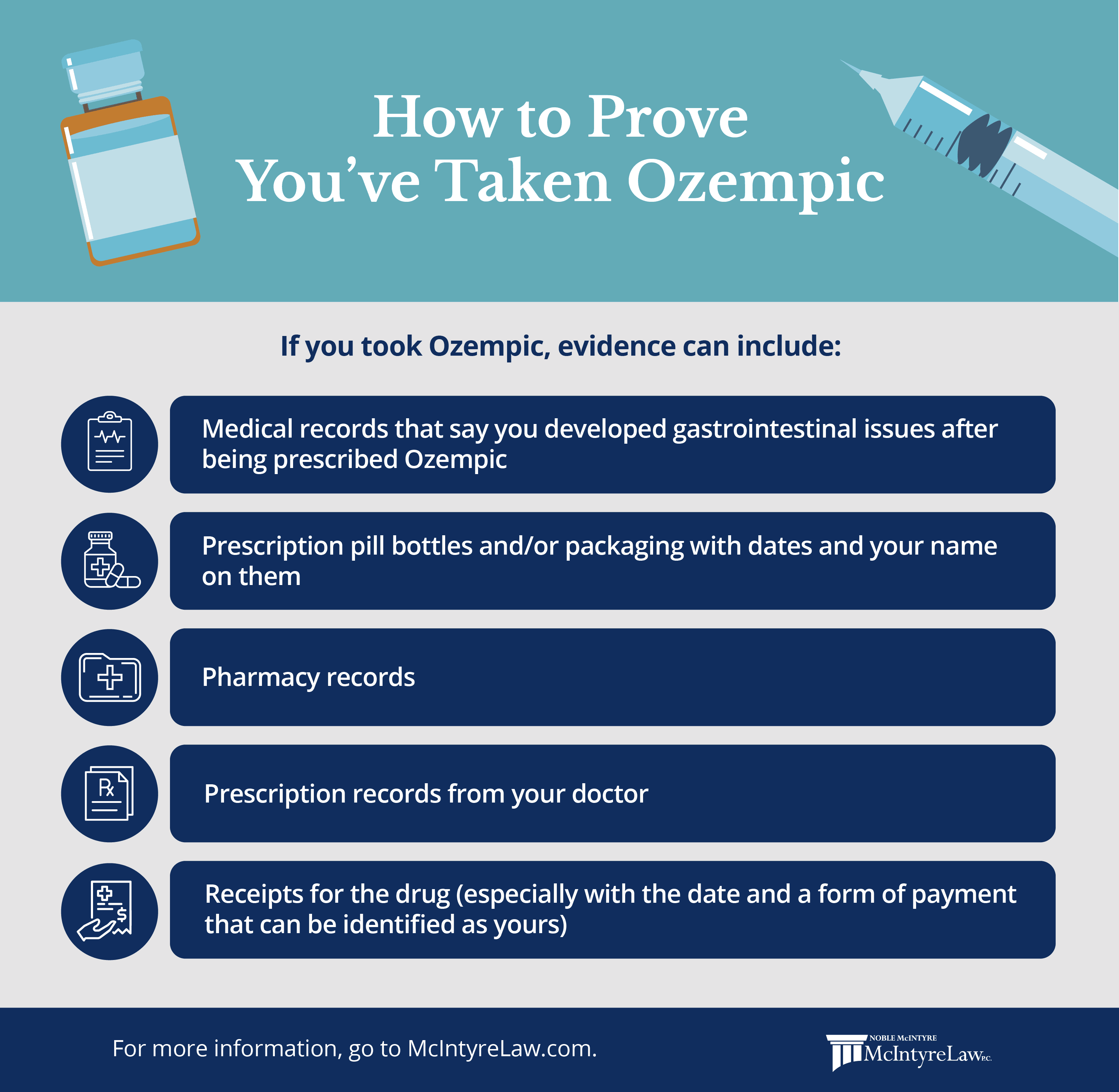Ozempic (semaglutide) Lawsuits
The popular weight loss drug Ozempic – prescribed under an array of names including Wegovy, Rybelsus, or its original compound, semaglutide – is under scrutiny for playing a major role in its users’ development of gastrointestinal issues. Originally approved by the FDA to treat Type 2 Diabetes, medical professionals have been quick to prescribe Ozempic to patients not only for the treatment of Diabetes, but for its appealing side effect – rapid weight loss. Pharmaceutical companies spent millions of dollars to aggressively promote Ozemic to medical professionals, and patients are paying the price. If you have been negatively impacted by Ozempic or semaglutide under any other name, know that you are not alone in your pain or your right to compensation.
Get a free consultation today. Call us at:

Is there currently a class-action Ozempic (semaglutide) lawsuit?
Ozempic’s creator, Novo Nordisk, is facing a class action suit in the Canadian court system, following the formation of a US class action centralized in Delaware. Plaintiffs’ claims emphasize the negligence of Ozempic distributors when promoting the drug, citing a lack of information about the array of potential negative side effects.
Medical professionals and patients alike were left misinformed and subsequently, severely harmed. No jury trial or settlement has occurred in either jurisdiction, but the FDA now required an addendum be included with the Ozempic warning label, citing intestinal blockage and obstruction as a potential side effect.
How is a class-action Ozempic lawsuit different from individual cases?
A class action lawsuit is a vehicle for combining the claims of multiple harmed parties united in a common goal. This is designed to lessen the load on the court system and provide a more expedient path to due process. A class action suit is a powerful means of creating a robust argument for the courts, and just as there is power in numbers, there is peace of mind in understanding that you are not alone as you undertake the legal process.
McIntyre Law is committed to representing their clients in mass torts because we know how daunting it can be for an individual to go up against Big Pharma. We’re here to shoulder the burden and be the voice of Davids facing Goliath. We’re armed with the knowledge to represent your best interest, and will do everything in our power to make sure you’re compensated for your injury.

What to Know Before You File a Lawsuit
We know that filing a lawsuit is not an everyday occurrence, and we’re here to help you streamline the process. In a drug liability suit, it’s up to you and your legal team at McIntyre Law to prove the harm sustained by Ozempic. In order to do this, we’re here to help you with the following:
- Collect all necessary medical records to best present your health appointments and history in a way that proves how you were harmed.
- Prepare for the fact that the amount of time a healthcare provider may hold onto your medical records can vary from state to state. We’re prepared to contact all previous providers to collect the most accurate representation of your health history.
- Join forces with a Law Firm that will act in your best interest. No two law firms are the same, and here at McIntyre Law, our team is dedicated to you and your case. Pursuing self-representation or partnering with an unreliable firm can be costly.
What is a contingency fee?
A “contingency fee” is an agreement that stipulates that payment for legal representation is to be a fixed percentage of any monetary award that may result from your Wegovy lawsuit. This means that McIntyre Law receives payment if and only if you receive payment.
The Statute of Limitations for Ozempic Lawsuits
Any drug liability lawsuit, such as a suit against Ozempic, is subject to a limitation on when a suit may be filed. This window of time begins when symptoms present and ends at a time that varies by state. In some states, the window may be as narrow as one year. For this reason, it’s vital that you bring your case forward as soon as possible in order to file within your state’s dedicated timeframe.
What compensation can I get from an Ozempic lawsuit?
Should the court rule in our favor, it is likely an award amount will be assigned to you based on the extent of the damages you sustained. Award amounts for semaglutide lawsuits vary from case to case, but compensation may be assigned according to the following:
- Pain and suffering
- Medical bills (past and future)
- Lost income
- Future expenses
- Reduced quality of life
- Wrongful death
- Punitive damages

Working with McIntyre Law
At McIntyre Law, we are driven by a desire to do the right thing. We will not back down from a fight and will be with you every step of the way as we guide you in your suit against Ozempic manufacturers. For far too long, Big Pharma has been allowed to run rampant with little to no accountability for the harm they cause. We understand your pain and we are prepared to pursue justice right alongside you and secure the compensation you deserve.
Do you have a case for an Ozempic (semaglutide) lawsuit?
If you are wondering if your case is eligible for a lawsuit, we’re standing by to provide a thorough consultation, free of charge. Ozempic is extremely prevalent in the media, yet none of its users were properly warned of its dangers. Your suit may have grounds for award if you have taken Ozempic, Wegovy, Rybelsus or another form of semaglutide and:
- Have developed gallbladder disease
- Are suffering from intestinal blockage
- Developed gastroparesis
- Are suffering from frequent or constant:
- Vomiting
- Nausea
- Abdominal pain
We’re ready to speak with you about your case. Let’s work together to win compensation for your pain and suffering.

How can you prove you’ve taken Ozempic or another semaglutide medication?

One of the most important things you’ll have to prove in an Ozempic or Wegovy lawsuit is that your symptoms began after you began taking the drug. Applicable evidence may include:
- Medical records that say you developed gastrointestinal issues after being prescribed Ozempic
- Prescription pill bottles and/or packaging with dates and your name on them
- Pharmacy records
- Prescription records from your doctor
- Receipts for the drug (especially with the date and a form of payment that can be identified as yours)
Meet Our Ozempic Attorneys
The team at McIntyre Law is like no other. Our attorneys are not only incredibly seasoned and successful in their practice, they are eager to support you when you need it most. We understand that every case is different and we’re here to give you the time, attention and result that you deserve. Learn more about our team below:

Noble McIntyre

Jeremy Thurman

Jordan Klingler

Monica Schweighart

Brenda Gómez O’Dell

Sarah Ramsey

Mario D’Angelo, Esq.

Daniel Zonas

What is Ozempic?
Ozempic, Wegovy and Rybelsus all include the active compound semaglutide. Ozempic has been approved by the FDA for the treatment of Type 2 Diabetes, while Wegovy has been approved for the management of obesity. Both of these forms are administered via subcutaneous injection into the abdomen, thigh or upper arm. Rybelsus is administered orally and is FDA approved for the treatment of Type 2 Diabetes.
Ozempic and its counterparts have recently gained rapid popularity given its ability to suppress appetite, resulting in rapid weight loss for many users. For this reason, Ozempic and Rybelsus have begun to be prescribed off-label, which has resulted in many people experiencing harmful side effects.

How does semaglutide work?
Semaglutide mimics the peptide GLP-1, which plays a significant role in the body’s regulation of appetite and food intake. This aids the body in reducing blood sugar spikes, which in turn lowers insulin levels, contributing to more sustained energy and weight loss.
Who manufactures Ozempic, Wegovy and Rybelsus?
Danish drug manufacturer Novo Nordisk produces all three semaglutide drugs and is headquartered in Denmark and traded on the NYSE. The company has been in business for 100 years and experienced some of the most rapid growth in its history following the production of its Ozempic and Wegovy products. The company is expecting an increase in its sales in 2023 that will exceed 30%.
Side Effects and Risks
Symptoms experienced by semaglutide users vary from patient to patient. You may have grounds for an Ozempic or Wegovy lawsuit if you:
- Have developed gallbladder disease from semaglutide
- Are suffering from intestinal blockage
- Developed gastroparesis
- Are suffering from frequent or constant:
- Vomiting
- Nausea
- Abdominal pain
Reported side effects of Ozempic and Wegovy
Ozempic side effects that are officially recognized by Novo Nordisk include:
- Inflammation of your pancreas (pancreatitis)
- Changes in vision
- Low blood sugar (hypoglycemia)
- Kidney problems (kidney failure)
- Serious allergic reactions
- Gallbladder problems
The most common side effects of Ozempic may include nausea, vomiting, diarrhea, stomach (abdominal) pain, and constipation.
Reported side effects of Rybelsus
Side effects officially recognized by Novo Nordisk include:
- Inflammation of your pancreas (pancreatitis)
- Changes in vision
- Low blood sugar (hypoglycemia)
- Kidney problems (kidney failure)
- Serious allergic reactions
- Gallbladder problems
The most common side effects of Rybelsus may include nausea, stomach (abdominal) pain, diarrhea, decreased appetite, vomiting, and constipation. Nausea, vomiting, and diarrhea are most common when you first start Rybelsus.
Does Ozempic cause stomach paralysis?
One of semaglutide’s functions is to slow digestion and “gastric emptying”, leading users to feel full quicker and longer. Sometimes, however, gastric emptying is slowed so much that the body develops a paralysis of the stomach muscles, or “gastroparesis”. The gastroparesis that’s caused by Ozempic, Wegovy and other semaglutide products can lead to severe symptoms, such as malnutrition, dehydration, and a weakened immune system.
Symptoms of stomach paralysis after taking Ozempic
Symptoms of stomach paralysis may include:
- Indigestion
- Bloated stomach
- Feeling full very quickly and/or for a long time
- Upper abdominal pain
- Nausea and vomiting
- Regurgitating (spitting up) whole pieces of undigested food
- Loss of appetite
- Acid reflux and heartburn
- Constipation
- Blood sugar fluctuations
Severe side effects of semaglutide
Severe side effects of semaglutide may include:
- Bloating
- Excess air or gas in the stomach or intestines
- Gaseous stomach pain
- Heartburn
- Recurrent fever
- Stomach discomfort, fullness, or pain
- Yellow eyes or skin
- Burning feeling in the chest or stomach
- Indigestion
- Tenderness in the stomach area
Ozempic Recalls
At this time, no attempt has been made to recall Ozempic prescriptions, though the FDA has added an addendum to Ozempic’s warning label following allegations of the medications causing intense intestinal-blockage. Ozempic remains a popular weight-loss drug and though there are great concerns regarding comprehensive health, the public and the organizations that govern pharmaceutical practices are still largely concerned with weight loss as a whole.
Semaglutide and the FDA

The U.S. Food and Drug Administration (FDA) has been responsible for monitoring the labeling and side effects of semaglutide since the drug hit the market in 2017.
How did the drug Wegovy/Ozempic get approved by the FDA?
In 2008, clinical trials regarding semaglutide and its effects began gaining traction in the medical community. Four years later, Novo Nordisk, a Danish pharmaceutical company began developing a once-weekly semaglutide injection intended for the treatment of Type 2 Diabetes and called the new drug Ozempic.
In 2016, clinical trials for Ozempic began and concluded 18 months later. Ozempic hits the market in 2017 and is a near-immediate success.
In 2022, Novo Nordisk is faced with a lawsuit when a group of 7 claimants are granted class action status centralized in Delaware citing severe intestinal damage as a result of taking Ozempic. Novo Nordisk asks the courts for a dismissal, but is met with a Canadian class action citing similar claims.
Though no official court decisions or awards have been granted at this time, the FDA has recently added “severe risk of intestinal damage” to Ozempic’s warning label, and cases are underway in both the US and Canada.

